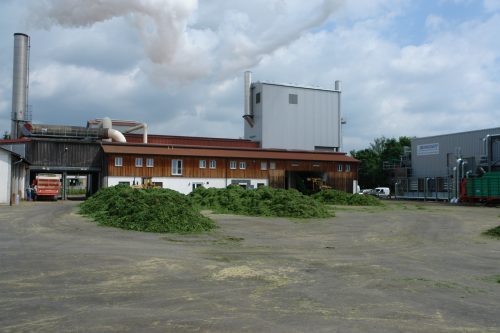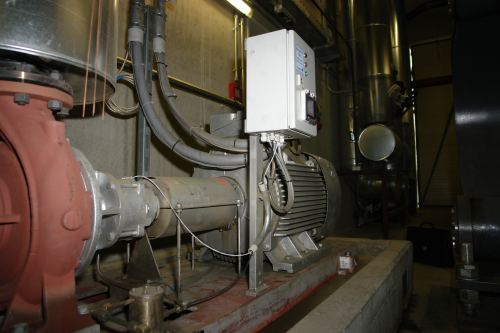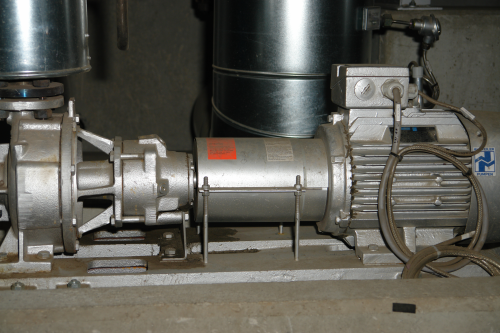


During the summer months, animal feed manufacturer Futtertrocknung Mindelheim eG of southern Germany uses ecological methods to generate the heat and electricity the company needs to dry soilage. Utilizing a year-round, low-temperature heating network in its co-generation power station, it supplies local industrial firms and public institutions with district hot water for heating and feeds electrical power into the public power grid. In total, the power plant delivers about 10,000 to 14,000 MW/h of useful heat yearly.
Centralized thermal oil pumps
The heart of the power plants are thermal oil pumps from Allweiler AG, a pump manufacturer based in Radolfzell, Germany. These pumps feed hot oil at temperatures up to 350°C into a heat exchanger where the silicon oil is heated to the point of vaporization. The hot silicon-oil vapor drives the Organic Rankine Cycle (ORC) turbine to produce electrical power.
The power plant is fired with wood chips provided by local landowners. The wood chips themselves are produced from scrap wood after heavy storms or during forest thinning efforts, making them a ‘renewable resource’. The power plant produces not only electricity, but also hot water for distant heating. This system gives the Mindelheim animal feed company the most modern and efficient process available for producing power in a co-generation biomass plant.
The power plant gives the cooperative a year-round source of income because it provides electrical power and heat at all times of the year regardless of whether animal feed is being dried or not. Until recently, heat and power were produced for only 2,000 to 2,500 hours per year, but the system now runs around-the-clock throughout the year. The turbine produces approximately 1.5 to 1.6 MW; the boiler’s heating capacity is between 20 and 30 MW and the plant requires approximately 50,000 metric tons of wood chips each year.High pump requirements
Centralized thermal oil pumps which operate safely and dependably are critical for maintaining reliable energy production. One aspect of this is the high load placed on the pumps. Secondly, failure of a pump can have serious consequences, especially if hot oil escapes. This makes operators of heat-transfer systems very sensitive to leakage. For this reason, engineers walk a fine line when designing shaft seals in heat-transfer pumps. While water normally escapes through the sealing clearance in the form of vapor, escaping heat-transfer oil is always readily visible. This is why the leakage required for the shaft seal to function properly must be minimized as much as possible without overloading the seal.
The unusually high loads on the pump are the result of high temperatures and temperature differentials as well as decomposition reactions that may occur when the heat-transfer liquid is subjected to excessive thermal loads. In particular, the chain-like hydrocarbons decompose over time into ‘low boilers’ and ‘high boilers’. If the proportion of low boilers is too high, the pump may cavitate. High boilers appear in many forms, from bitumen-like consistency to extremely hard carbonized products which accelerate wear on the pump. Both threaten the pumps’ bearing and shaft seal.
The Mindelheim power plant uses synthetic thermal oils which reduce the formation of low and high boilers. The low viscosity and low lubricity of these materials mean they have disadvantages as well such as the tribological loads on the gliding components of mechanical seals being particularly high.
Continuous power generation
Since the power plant is controlled automatically and without human input almost all the time, the ability to react rapidly to disturbances is, in addition to reliability, a critical requirement. Pumps from the ‘Allheat’ series, used in conjunction with the new Allready Box, fulfill both requirements. Firstly, these pumps have been developed over many years to handle hot liquids. Secondly, the new Allready Box gives the operator several options for disturbance notification and for reacting to those situations.
The cooperative decided to retrofit their equipment with this safety device after a disturbance on New Year's Eve 2008, whereby a defective seal allowed hot oil to escape. Fortunately, the resulting smoke was quickly noticed and damage was limited. Technical director Johann Rogg said: “Ever since then, Allready Box has been an essential feature of all of our thermal oil pumps.” The fact that the generation of power must be interrupted for only a short period of time makes the investment worth the money in every situation, according to Rogg. Based on this experience, the cooperative has already decided to equip the third pump with Allready Box.
Detecting potential problems
Before Allready Box, control devices monitored outlet pressure and pump capacity, however deviations from normal operation were not noticeable until it was too late. The pump operator cannot react fast enough to prevent major damage or long-term production losses.
Allready Box, on the other hand, reacts immediately and draws attention to potential malfunctions as they arise. It monitors two important components of every pump: the temperature of the shaft bearing and performance of the seal. Warning and alarm thresholds are defined for each of these items. If threshold values are exceeded, the Box executes a series of programmable actions. Optical notifications on the pump alert the user whenever these values are exceeded. If desired, the device can also emit an acoustical alarm and/or forward the alarm to a remote location. Alarms can be forwarded to a monitoring station, transmitted over the Internet, or sent to any desired recipient in the form of a text message.
Rogg said: “If the box detects any irregularities I immediately receive notification, even if I am not at the plant or on-site. This gives me the ability to react immediately and - if necessary - shut down the pump or the entire plant without leaving my house.” Depending on the operator's requirements, Allready Box can even shut down malfunctioning pumps on its own and bring reserve pumps into operation. This feature is not utilized at the Mindelheim plant because the technicians prefer to view the situation with their own eyes first.
Lower total costs
Another benefit of using Allready Box will be noticed in Mindelheim after a few years. Since it reliably detects wear of the seal after it has actually reached the critical level, excessive preventive maintenance is no longer necessary. Maintenance intervals are now much longer than before and maintenance is performed only when actually necessary.
Allready Box lets operators fully exploit the maintenance benefits of high-quality pumps with a long service life. As a result, typical maintenance costs for pumps in heat transfer systems are reduced by up to 50%. For this reason alone, this simple yet effective system pays for itself within a short period of time and gives operators of heat-transfer systems the security of knowing that they have everything under control at all times.
Allready Box is compatible with all Allweiler heat-transfer pumps of the NTT series as well as ALLHEAT NTWH and CTWH. This monitoring device can be mounted on new pumps or retrofitted to older pumps at any time.




